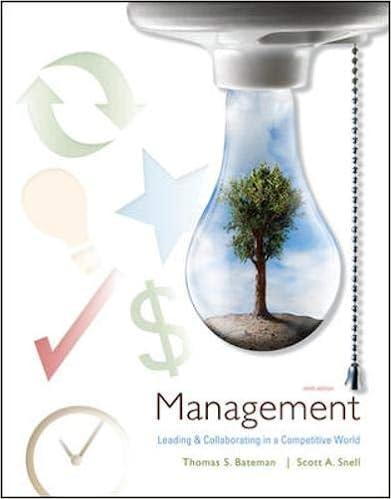Zappos.com is the inspiration of Tony Hsieh, a 30-something Harvard graduate with a penchant for launching successful
Question:
Zappos.com is the inspiration of Tony Hsieh, a 30-something Harvard graduate with a penchant for launching successful businesses. In his first commercial enterprise at age 12, he made and sold buttons. As an undergrad, Hsieh sold pizzas out of his dorm room. After college, he founded LinkExchange, an advertising network that enabled small businesses to barter for banner ads. He sold the business to Microsoft two years later for a cool $265 million. Not long afterward, Hsieh became involved with a struggling online shoe store that he renamed Zappos—after the Spanish word zapatos, “shoes.” He quickly identified excellent customer service as a key success factor to differentiate his company and saw that employees who were happy would make sure that customers were, too. He moved the company to Las Vegas because of the city’s reputation for service businesses and its 24/7 culture—the same as a customer service representative’s time schedule. In nine years, Zappos soared from zero revenue to the $1 billion sales mark. The pay at Zappos is not the determining factor in motivating employees. In fact, Zappos’s salaries are generally at or below the general market level. In addition, the higher the position in the company, the more below-market the salary. Hsieh himself earns only $36,000 but claims pay does not motivate him; it’s the challenge of creating something new. If it’s not the money, then what keeps Zappos’s customer service reps motivated? Hsieh points to the company’s culture. Workers are encouraged to do their best, use their own good judgment, and be themselves. Sales reps do not follow a canned script, and no one pushes them to keep service calls short. Instead, employees are encouraged to chat with customers since, Hsieh says, “For us, every interaction is [an] opportunity.” He recites with pride specific instances in which employees listened to customer problems and went beyond a routine response. For instance, one woman who had ordered boots for her husband called for help in returning them because he had died in a car accident. The Zappos rep not only arranged for free return of the boots, but sent her flowers.
• Zappos CEO Tony Hsieh said he decided to sell his business LinkExchange after it no longer felt rewarding. Instead, he wanted a company where he and his employees could be happy. What types of needs does the Zappos culture help fulfill?
• Hsieh sees customer service not as a company expense but as an opportunity to develop a relationship with customers. The company celebrates the on-the-spot decisions that its service reps make to satisfy customers. How does this help motivate employees?
Step by Step Answer:

Management Leading And Collaborating In The Competitive World
ISBN: 9780078137242
9th Edition
Authors: Thomas Bateman, Scott Snell





